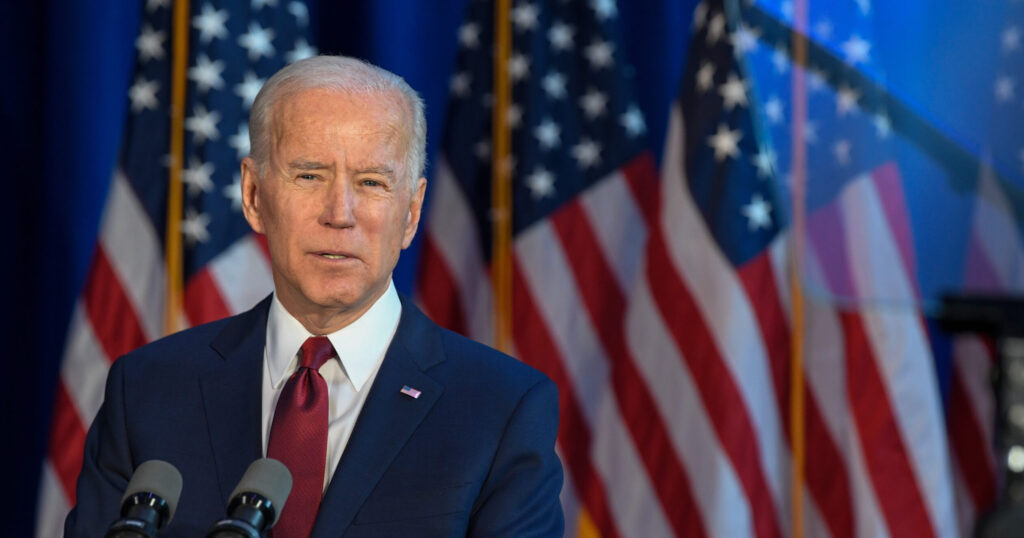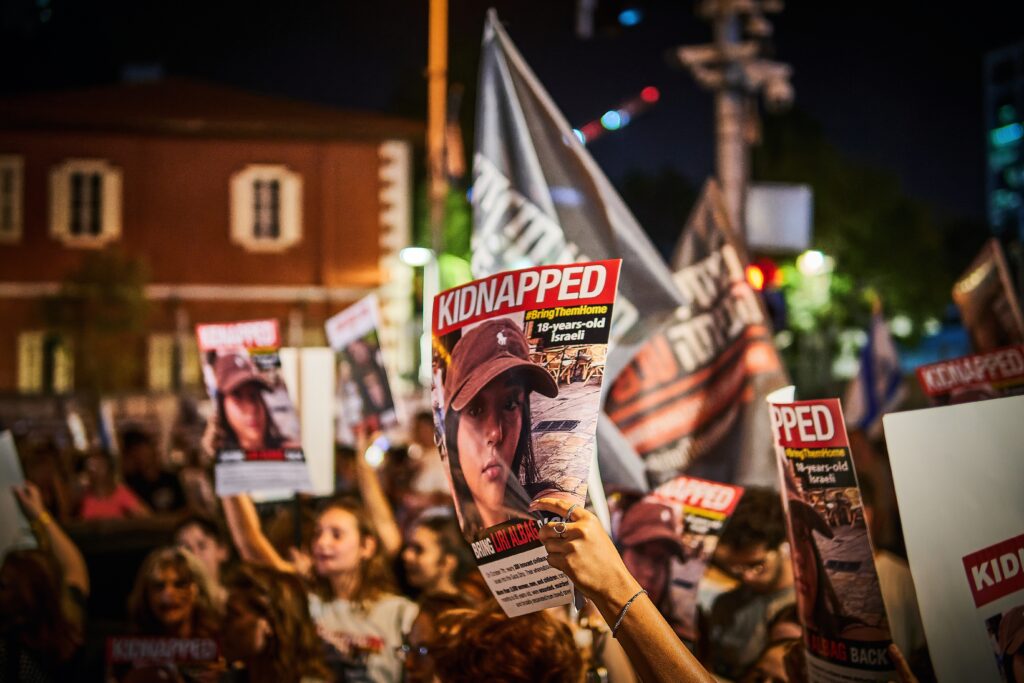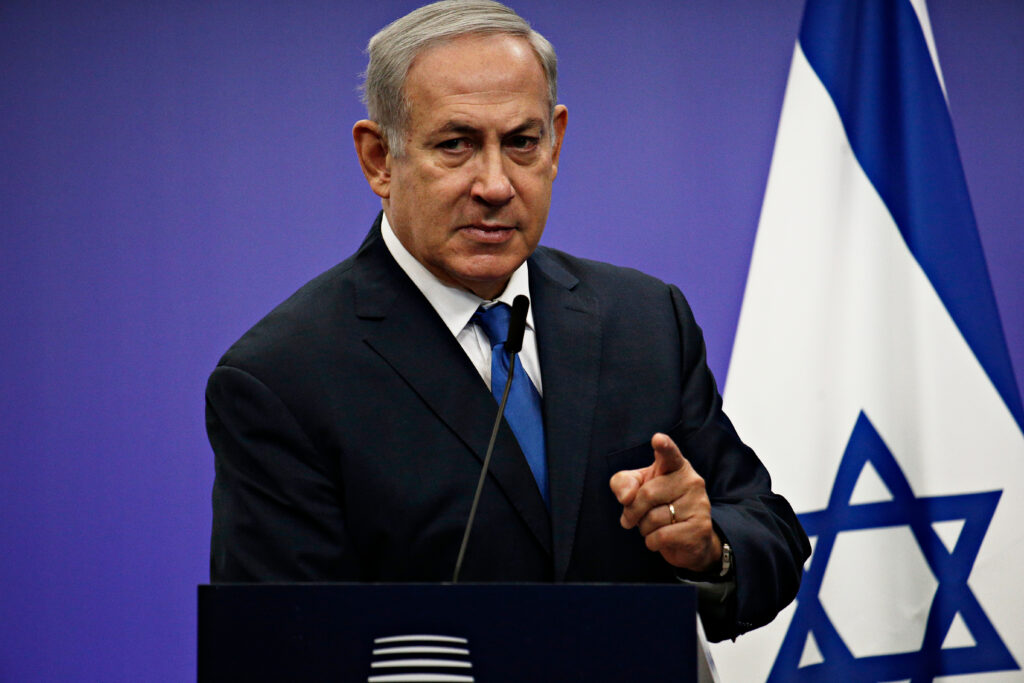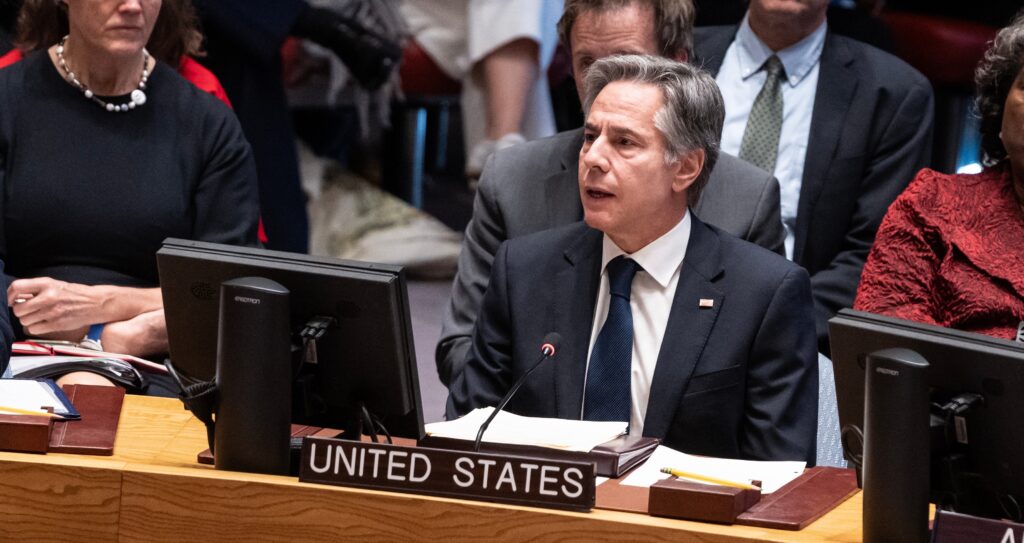- About Us
- Policy Center
- Learn
- Press Room
- Blog
- Get Involved
- Donate
- Donate to J Street Online
- Make a Gift in Someone’s Honor or Memory
- Make a Monthly Gift
- Tax-Deductible Donations
- Giving by mail
Remarks delivered by J Street President Jeremy-Ben Ami at the 2024 Spring Assembly.
Good afternoon. Those were two great conversations – thank you again so much to Ambassadors Wendy Sherman and Tom Nides.
And thank you to the J Street leadership for coming to DC at such an important time.
This is a great gathering – with hundreds of our top leaders and supporters, dozens of student leaders from J Street U and dozens of Rabbinic and Cantorial Cabinet members.
And together we mark a somber milestone: Six months since the horrific October 7 attack.
Six months of calamitous war, bloodshed and suffering.
Through these difficult months, one thing that’s kept me going is the incredible community we’ve built at J Street.
Consistently in my travels around the country, I hear gratitude from all of you for the home that J Street has become for so many.
A community of like-minded people – staking out balanced and nuanced approaches to complex challenges, capable of demonstrating empathy and of seeing multiple perspectives.
I won’t pretend it’s always easy to stake out the J Street point of view – or that all of J Street sees eye to eye at every moment on the positions we’ve taken or the words we’ve used.
I’ve had the good fortune to see many of you at talks around the country over the past month so you’ve heard me framing 2024 as a “Year of Consequence” for both the United States and Israel.
In less than seven months, we in the US will have a monumental choice to make about our future – what kind of country do we want to be after 250 years? Will our democracy hold or will we allow the ascent to power of an autocrat backed by an ethnonationalist movement that endangers our freedom and wellbeing?

J Street is proud to support pro-Isarel, pro-peace, pro-democracy candidates like President Biden.
And in Israel, one prays that sooner rather than later the fighting in Gaza will come to an end and the people of Israel too will face a choice and a reckoning – not just over the policies and politics that allowed for October 7 but the lasting damage that has been done to the country by its reaction to October 7 and the conduct of this war.
Israelis too may well go to the polls this year – again, one prays sooner rather than later – and they face a similarly critical choice between democracy and autocracy, between equality and ethnonationalism, and decisions about what security looks like and the role of religion in their state.
These are moments of existential importance to both countries – and I can assure you that J Street will have a voice in these debates and – at least in the American elections – a say in the outcome.
In these past months, our voice has been more needed than ever – representing a point of view that I would call “large in number but low in volume.” The voice of those on the political spectrum between the extremes at the edges of the debate.
That space in the middle is never easy to occupy.
Our own J Street tent is itself fairly wide, I probably don’t need to tell you.
At one end of that tent, I hear discontent that all J Street ever does is criticize Israel. That our statements don’t convey adequate love of or concern for Israel or sufficient recognition of the trauma through which our Israeli friends and family are still living.
From the other end of our tent, I hear growing frustration that our positions are not bold and tough enough toward the Netanyahu government. That the words we use are too mild, that we are pulling punches both toward the Biden Administration and toward Israel.
I know that in this room today are people who hold both of those feelings.
I would go further and argue that in this room today, most of us hold a little bit of both of those feelings ourselves.
Most of us have been trying to balance our internally conflicted feelings for the better part of six months now.
I continually say that the most important word in J Street’s vocabulary throughout this crisis has been the word “and.”
The pressure from the loudest voices at the poles of the debate is to choose a side, to stake out an absolute position.
For those at the poles, one side is simply evil, the other good.
One side sees a justified war of self-defense; the other a genocidal war aimed at ethnic cleansing.
One side calls friends of Israel colonialist supporters of apartheid; the other calls all critics of Israel and Zionism antisemites.
The rhetoric is heated; emotions high.
And the tension this conflict is generating is not simply about war’s conduct or about US or Israeli policy. The arguments run so much deeper.
Take the question of Zionism and the justice of there being an Israel in the first place.
Our movement’s long-time friend Peter Beinart has posited recently that there is an inevitable either-or choice between Zionism and liberalism – between supporting the right of the Jewish people to a state that is their national homeland and the liberal values that form the core identity of many Jewish Americans.
In shaping the debate in such stark black and white, Peter has chosen to write out of the story the entire concept of liberal Zionism – the space in the debate that not only J Street stakes out, but that I would argue the majority of Jews in the US hold.
The Jewish people do have a deep and historic connection to the land of Israel. Their return to their ancient homeland is just and it does not fit the colonialist narrative of oppression that some insist on applying.
AND
The Palestinian people too have a deep and historic connection to the exact same land.
If our liberal values are to mean anything, then the way the Jewish people implement our right to a national home between the Jordan River and the Mediterranean Sea cannot be at the expense of another people with the exact same right.
Only when both people’s rights are recognized, respected and fulfilled can we hope to find a resolution to the terrible conflict between them.
Only a solution grounded in AND will lead to a better future.
That is what has guided J Street’s work for 16 years and during the last six months.
On the one hand, we feel deeply the pain of the Israeli people in the wake of the October 7 massacre. Our movement lost friends and family that day, and we continue to keep the hostages and their families in the front of our minds at all times.

The mother and daughter of a 23-year-old hostage held in Gaza, Romi Gonen, joined the J Street Spring Assembly.
We recognized – from day one – the right of the state of Israel to defend itself, to hold the perpetrators of this attack to account and to remove Hamas from operational control of Gaza.
We recognized that there will never be a peaceful resolution of the Israeli-Palestinian conflict with Hamas in control of Gaza. We take them at their word that their goal is the elimination of the state of Israel and their intent to repeat October 7-style attacks again and again.
All that said, we’ve been equally clear that Israel’s legitimate response needed to adhere to the laws of war, to international humanitarian standards and to the terms and conditions that govern America’s ongoing provision of security assistance to Israel.
We have called for pauses in the fighting, for changes in Israel’s military approach, for tougher love from the Biden Administration and for a negotiated ceasefire to bring out the hostages and to surge humanitarian assistance.
Yet as we hit the six-month mark today, we must recognize that the Netanyahu government has done remarkably little of what J Street, the Biden Administration and the rest of the world have asked.
33,000 Palestinians and counting are now dead and nearly 75,000 more wounded, according to the Palestinian Health Ministry – some number of whom are Hamas militants. That’s nearly one in 20 residents of the Gaza Strip.
Most of Gaza’s families have been displaced, many with their homes destroyed or damaged. Much of the population is on the brink of famine.
The stories about the state of medical treatment, the spread of disease, the daily search for food are heartrending.

The impact of the Gaza war on Palestinian civilians has been catastrophic. Far more must be done to protect civilians, aid workers, journalists and others caught in the crossfire.
J Street has said time and again that a sizeable share of the responsibility for this calamity rests with Hamas which has shown callous disregard for the very people it supposedly rules and fights for.
Hiding in a billion-dollar terror network beneath schools, hospitals, mosques and homes and turning an entire civilian population into human shields is itself a war crime.
But the Israeli response to October 7 has been beyond what President Biden has termed “over the top.”
The humanitarian toll of this war is morally unacceptable. There are very likely significant violations of international law.
And – further – Israel’s response has been a long-run strategic setback, costing the country legitimacy in the eyes of the rest of the world and creating undoubtedly a new generation of terrorists, not just in the Palestinian population but throughout the region and around the world.
This war is also a serious setback for the interests and values of the United States. As Israel’s primary benefactor and protector in the international arena, the US is held appropriately accountable for the actions of our ally Israel.
We supply the arms and then we protect Israel from full accountability for its actions under international law.
For many months now, J Street has pushed the Biden Administration to take a tougher line in its dealings with the Netanyahu government on a range of important issues – not just impacting Gaza but the broader conflict too.

Netanyahu’s leadership has been disastrous for Israel, long before October 7.
American military aid cannot be a blank check – there must be restrictions on its use, oversight and accountability around compliance with the law and consequences when those limits are breached.
We have seen some of what we’ve urged finally implemented by the administration:
But there is so much more that needs to be done.
When Israel breaches its responsibilities, either in the way it uses the weapons we provide or in preventing the flow of humanitarian aid to civilians in a conflict zone, the administration should be ready to enforce our own laws and stop the flow of the very weapons doing the damage.
That doesn’t mean leaving Israel unprepared to defend against the very real threats it faces – and we are deeply conscious of the imminent threat of a larger conflict with Iran in the coming hours and days.
But it does mean that the US-Israel relationship can’t be a one-way street where our laws and requests are boldly disregarded.
The US also cannot provide diplomatic immunity for Israel in the UN and other international arenas. Not only should the US not be vetoing resolutions that align with its own policies, it should be drafting and leading resolutions to hold Israel – and other nations – to the standards of the international legal order.

The United States must show leadership across the region and around the world. We must chart a course to a better future.
The pressure the US brings on Israel must not only be behind closed doors but in public – not simply to turn up the heat on Israel but to reassure global audiences and domestic constituencies that the United States is putting meaningful muscle into enforcing values and laws it claims to champion.
Finally, the US must address the underlying Israeli-Palestinian conflict in a meaningful way. For decades now, we have mouthed concern over the occupation, we have issued statement after statement extolling two states – but we have done next to nothing to actually bring it about.
There must be no more talk from this day forward of “shrinking” or “managing” the conflict. There must be no more thought that there is a way to normalize Israel’s relations with its Sunni Arab neighbors while ignoring the underlying Israeli-Palestinian conflict.
When the fighting in Gaza is done – the US must build the broadest possible international coalition and insist on the implementation of a comprehensive, regional security initiative that resolves this conflict once and for all.
President Biden should – in very short order – lay out in a major presidential address his plan for bringing resolution to this conflict.
He should make clear his intention to be the President on whose watch a fully independent, secure and prosperous Palestinian state comes into being and who brings about the full normalization of Israel’s relations with its neighbors.
This initiative is the only effective way to defeat Hamas.
Those on the Netanyahu/Trump/MAGA Right will claim that the creation of a Palestinian state is a gift to the terrorists and extremists who masterminded and executed the October 7 attack.
But the opposite is true. Hamas, Iran and other extremists will only be defeated when the source of Palestinian grievance – their lack of freedom and perpetual occupation – is actually addressed.
The road down which the political right seeks to lead Israel and the United States is sold to us as grounded in concerns about security.
Those of us in the political center and center-left must reclaim the mantle of security.
On whose watch did October 7 occur?
Who let down the guard on the southern border of Israel because troops were busy on the West Bank guarding illegal settlements and dealing with the bubbling tensions caused by demolitions, land grabs and settler violence?
Who provided the cash that funded Hamas’ massive tunnel infrastructure? Who ignored the intelligence reports of impending attack?
While it must be said that Palestinians will never gain their freedom through terror, it is equally true that Israelis will never gain security through military force alone.
The majority of Americans, Israelis and Palestinians have always at the end of the day recognized that sensible compromises that resolve conflict are preferable to the violence and bloodshed caused by extremists less interested in solving problems than seeking unattainable absolute victory.
The work ahead for J Street in this year of consequence is clear: To ensure American democracy emerges as the winner in the 2024 election and to lay the groundwork for a serious diplomatic initiative to resolve this conflict when the present fighting is over.
I am deeply grateful to everyone here for your contributions to our movement and I’m looking forward to the important work we will be doing together in 2024 and beyond.
Give Voice to Your Values